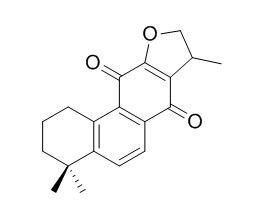Isocryptotanshinone
Isocryptotanshinone inhibits protein tyrosine phosphatase 1B (PTP1B) activity with 50% inhibitory concentration values of 56.1±6.3 μM, PTP1B acts as a negative regulator of insulin signaling, and selective inhibition of PTP1B has served as a potential drug target for the treatment of type 2 diabetes.
Inquire / Order:
manager@chemfaces.com
Technical Inquiries:
service@chemfaces.com
Tel:
+86-27-84237783
Fax:
+86-27-84254680
Address:
1 Building, No. 83, CheCheng Rd., Wuhan Economic and Technological Development Zone, Wuhan, Hubei 430056, PRC
Providing storage is as stated on the product vial and the vial is kept tightly sealed, the product can be stored for up to
24 months(2-8C).
Wherever possible, you should prepare and use solutions on the same day. However, if you need to make up stock solutions in advance, we recommend that you store the solution as aliquots in tightly sealed vials at -20C. Generally, these will be useable for up to two weeks. Before use, and prior to opening the vial we recommend that you allow your product to equilibrate to room temperature for at least 1 hour.
Need more advice on solubility, usage and handling? Please email to: service@chemfaces.com
The packaging of the product may have turned upside down during transportation, resulting in the natural compounds adhering to the neck or cap of the vial. take the vial out of its packaging and gently shake to let the compounds fall to the bottom of the vial. for liquid products, centrifuge at 200-500 RPM to gather the liquid at the bottom of the vial. try to avoid loss or contamination during handling.
Molecules 2022, 27(3),960.
Int J Immunopathol Pharmacol.2019, 33:2058738419857537
Phytomedicine.2018, 38:45-56
Fitoterapia.2018, 124:92-102
J Nat Prod.2015, 78(6):1339-4
Int J Biol Sci.2023, 19(10):3077-3098.
Earth Environ. Sci. 2021, 905:012080.
Front Aging Neurosci.2019, 11:230
Talanta.2023, 262:124690.
J Separation Science & Technology2016, 51:1579-1588
Related and Featured Products
J Breast Cancer. 2015 Jun; 18(2): 112–118.
Isocryptotanshinone Induced Apoptosis and Activated MAPK Signaling in Human Breast Cancer MCF-7 Cells.[Pubmed:
26155286]
Isocryptotanshinone (ICTS) is a natural bioactive product that is isolated from the roots of the widely used medical herb Salvia miltiorrhiza. However, few reports exist on the mechanisms underlying the therapeutic effects of ICTS. Here, we report that ICTS has anticancer activity and describe the mechanism underlying this effect.
METHODS AND RESULTS:
The antiproliferative effect of ICTS was determined using 3-(4,5-dimethyl-2-thiazolyl)-2,5-diphenyl-2-H-tetrazolium bromide (MTT) and clonogenic assays. The effect of ICTS on the cell cycle was measured using flow cytometry. Apoptosis was determined by Hoechst 33342 staining, DNA fragmentation assays, and Western blotting for apoptotic proteins. Finally, the effect of ICTS on mitogen-activated protein kinases (MAPKs) was determined by Western blotting. ICTS significantly inhibited proliferation of MCF-7 and MDA-MB-231 human breast cancer cells, HepG2 human liver cancer cells, and A549 human lung cancer cells in vitro. Among the tested cell lines, MCF-7 cells showed the highest sensitivity to ICTS. ICTS significantly inhibited colony formation by MCF-7 cells. Furthermore, exposure of MCF-7 cells to ICTS induced cell cycle arrest at the G1 phase and decreased mitochondrial membrane potential. Hoechst 33342 staining and Western blot analysis for apoptotic proteins suggested that ICTS induced apoptosis in MCF-7 cells. In addition, ICTS activated MAPK signaling in MCF-7 cells by inducing time- and concentration-dependent phosphorylation of JNK, ERK, and p38 MAPK.
CONCLUSIONS:
Our results suggest that ICTS inhibited MCF-7 cell proliferation by inducing apoptosis and activating MAPK signaling pathways.
Biol Pharm Bull. 2005 Sep;28(9):1795-7.
PTP1B inhibitory effect of abietane diterpenes isolated from Salvia miltiorrhiza.[Pubmed:
16141564 ]
Protein tyrosine phosphatase 1B (PTP1B) acts as a negative regulator of insulin signaling, and selective inhibition of PTP1B has served as a potential drug target for the treatment of type 2 diabetes.
METHODS AND RESULTS:
In the course of screening for PTP1B inhibitory natural products, the MeOH extract of the dried root of Salvia miltiorrhiza BUNGE (Labiatae) was found to exhibit significant inhibitory effect. Bioassay-guided fractionation and purification afforded three related abietane-type diterpene metabolites 1-3. Compounds 1-3 were identified as isotanshinone IIA (1), dihydroisotanshinone I (2), and Isocryptotanshinone (3) mainly by analysis of NMR and MS data.
CONCLUSIONS:
Compounds 1-3 non-competitively inhibited PTP1B activity with 50% inhibitory concentration values of 11.4+/-0.6 microM, 22.4+/-0.6 microM and 56.1+/-6.3 microM, respectively.
J Drug Target. 2016 Dec;24(10):934-942.
Isocryptotanshinone, a STAT3 inhibitor, induces apoptosis and pro-death autophagy in A549 lung cancer cells.[Pubmed:
26904961 ]
Signal transducer and activator of transcription 3 (STAT3) is a potential drug target for chemotherapy. Cryptotanshinone (CTS) was identified as a potent STAT3 inhibitor, while the effect of other tanshinones remains unknown.
METHODS AND RESULTS:
In this study, the influence of eight tanshinones on STAT3 activity was initially screened and Isocryptotanshinone (ICTS) significantly inhibited STAT3 activity in a dual luciferase assay. ICTS inhibited the constitutive and inducible phosphorylation of STAT3 at Y705 without affecting the phosphorylation of STAT3 at S727 in A549 lung cancer cells. Furthermore, ICTS inhibited the nuclear translocation of STAT3. Compared with CTS, ICTS exhibited a stronger inhibitory effect on STAT3 phosphorylation and on A549 cytotoxicity. ICTS induced autophagy as evidenced by the accumulation of autophagic vacuoles and the increased expression of LC3 protein and autophagosomes. ICTS-induced cell death was partially reversed by the autophagy inhibitor chloroquine. The docking assay predicted that both ICTS and CTS bind the SH2 domain of STAT3. ICTS formed hydrogen bonds and pi-pi interaction with the nearby amino acid residues of Lys591, Arg609, and Ser636.
CONCLUSIONS:
These findings suggested that ICTS, a natural compound, is a potent STAT3 inhibitor. ICTS induced apoptosis and pro-death autophagy in A549 cells.



